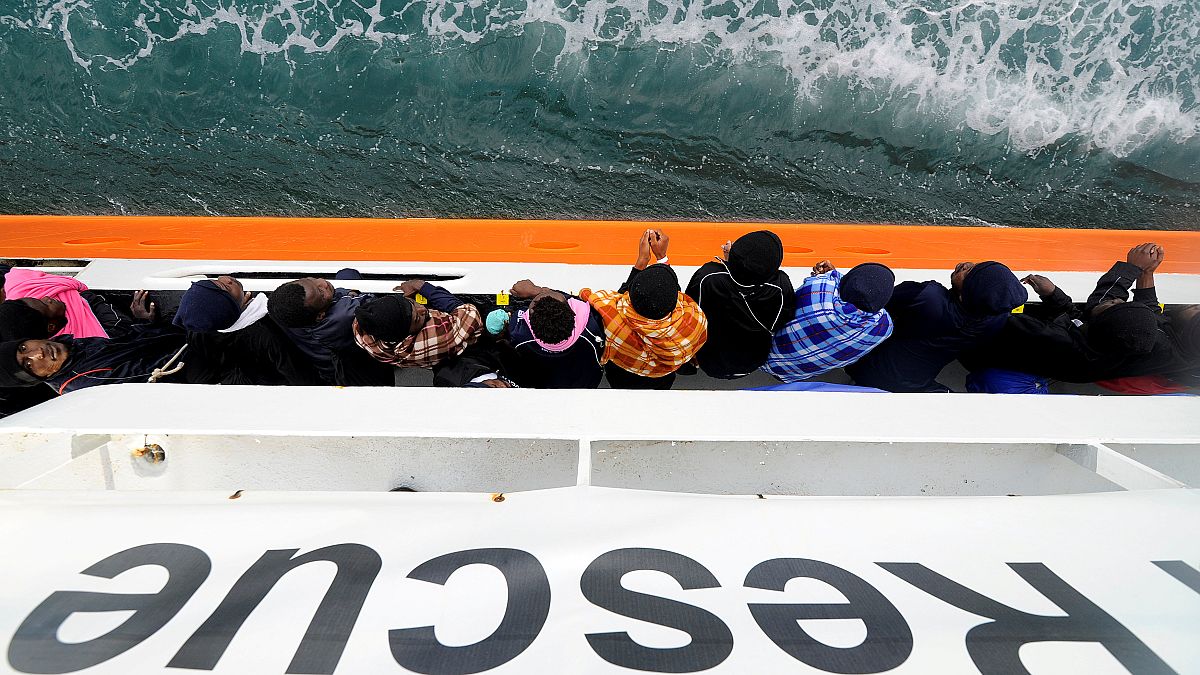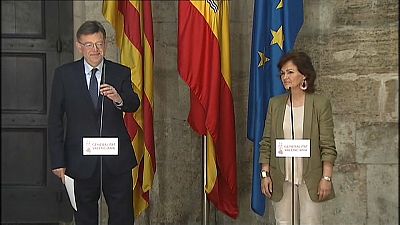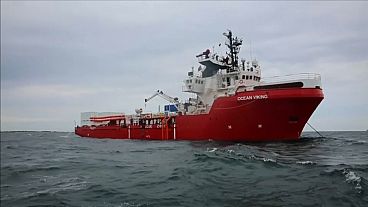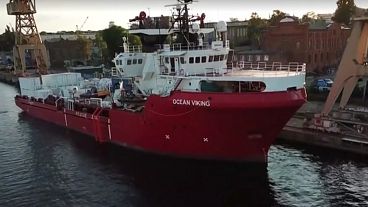The Aquarius: A look back on the torrid journey from Africa to Europe
After five gruelling days at sea, 600 North African migrants who set sail from the Libyan coast last week will soon land in Spain.
After several gruelling days stuck at sea, 600 North African migrants who set sail from the Libyan coast last week will soon land in Spain.
Around 11 children, seven pregnant women and 123 unaccompanied minors are thought to be on board the Aquarius, and two Italian boats which are escorting the vessel. The Aquarius rescue ship is being steered by NGOs Doctors without Borders (Medecins Sans Frontieres) and SOS Mediterranee.
Euronews’ correspondent Anelise Borges has also been there, documenting the journey day after day, talking to the passengers and volunteers about why they are there, their fears and their future plans.
Here’s what has happened so far:
June 7
Anelise Borges reports from the Italian town of Catania, which lies 300km from where another migrant ship carrying about 180 people had capsized. It was called one of the worst migrant boat disasters in recent memory, but it is one of many that have unfolded on the Mediterranean crossing — the deadliest migration route in the world.
June 10
Anelise is now aboard the Aquarius. More than 600 migrants have been pulled from the Mediterranean sea and taken on board over the previous two days. But plans to dock the boat and release its passengers in Italy are dashed: Deputy Prime Minister Matteo Salvini announces that all Italian ports are closed — and anxiety spreads throughout the ship.
June 11
"Saving lives at sea is a duty, but transforming Italy into an enormous refugee camp is not," Salvini declares on Facebook. "Italy is done bowing its head and obeying. This time there's someone saying no."
The Aquarius is at a standstill on international waters and there is no end in sight. Italy’s move to redirect the vessel to Malta has sparked a political standoff: Neither country will allow the ship to dock at their ports and the pool of migrant passengers is growing.
June 12
“I studied law. I want to help. I want to stop Boko Haram. I want to become a lawyer.”
There is hope of reaching land at last. Spain has granted passage for the Aquarius to port in Valencia. But it will be at least three days until the ship arrives, and volunteers fear they are rapidly running out of food.
Meanwhile, Anelise speaks to the passengers, who detail some of the horrific abuse they suffered before they embarked on their dangerous journey from Africa to Europe.
June 13
The ship is on the move. The migrants are relieved. The end of their ordeal is fast approaching.
“We ask God to bless Spain and all countries related to Europe. Thank you,” says one young man from Nigeria.
An Italian naval and coastguard ship have taken 500 people aboard and are escorting the Aquarius, which now carries just over 100 migrants, to Valencia.
But questions remain about what will happen next: Will they be able to stay in Europe? And if not, what will happen to them?
June 14
The political crisis that initially engulfed Italy and Malta has spread to France, whose ambassador to Rome has been summoned to answer for Emmanuel Macron’s criticism of Italy’s “cynicism and irresponsibility” in turning away the rescue ship.
Anelise reports on Good Morning Europe on the final leg of her journey.
June 15
Stormy weather is slowing the ship's progress towards Valencia, as Euronews' Anelise Borges tells Good Morning Europe.
June 17
A naval convoy, including Aquarius, prepares to dock in Valencia, Spain. You can watch live footage here.
Migrants that were on board the Aquarius rescue ship told Euronews' Anelise Borges of their relief at disembarking the vessel in Valencia, Spain.
This is the first time most on board will have set foot on dry land in over a week after a 1,300km-long ordeal.
As the Aquarius rescue ship docked in Spain, flanked by two other Italian boats, the migrants on board were given three forms.
One would allow them to stay in Spain for 45 days — a humanitarian permit while their asylum requests were assessed, according to the government.
The next two papers allowed the migrants to apply for asylum in Spain or France.
Spanish Deputy Prime Minister Carmen Calvo said that any migrants who wish to go to France would be allowed to do so, providing they had a legitimate claim to asylum.
Whether they decide to stay in Spain or go to France, they will have to handle red tape issues either to claim their right to asylum or to be granted residency.



